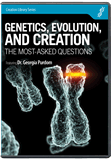
More Than Meets the Eye: The Human Genome
News Source
- BBC NEWS: “Human Genome Further Unravelled”
One of the most frequently posited arguments for evolution is the supposed similarity of ape and human DNA. For instance, it seems that nearly any article about “human-like” chimpanzee behavior manages to squeeze in a mention of ninety-some percent similarity between chimp and human genomes.
Answers in Genesis has long tried to show both the illogic and misunderstanding such claims spread. For one thing, similar genomes do indicate similar biological construction, but do not indicate common descent any more than they indicate common design. For another thing, the supposed similarity is often referenced without explanation of how the genomes are dissimilar.
Evolutionary science is just now catching up with the conclusions creationists have already drawn. “A close-up view of the human genome has revealed its innermost workings to be far more complex than first thought,” reports a BBC NEWS article on a recent Encyclopaedia of DNA Elements (Encode) study. Encode’s goal is to build upon the successful mapping of the human genome by understanding exactly how the genome works. The article explains:
The surprising results, explained Tim Hubbard from the Wellcome Trust Sanger Institute, “transform our view of the genome fabric.”
Previously, genome activity was thought of in terms of the 22,000 genes that make proteins—the functional building blocks in our cells—along with patches of DNA that control, or regulate, the genes.
The other 97% or so of the genome was said to be made up of “junk” DNA—so called because it had no known biological function. . . .
Dr Hubbard said: “We are now seeing the majority of the rest of the genome is active to some extent.”
The reality is that human understanding of how genes actually control biological construction is woefully inadequate, albeit advancing more each year. Claims that genome similarity between chimps and humans “prove” evolution are not only misleading; they are based on a considerably immature field of science.
Claims that genome similarity between chimps and humans “prove” evolution are not only misleading.
Beyond the chimp-human relatedness debate, this genomic revelation reminds us of the incredible information processing going on inside our bodies at each moment—information processing that puts human computing efforts to shame. Not only does evolution not explain how such intricate information could have evolved from scratch, it also fails to explain how such an advanced information-management system could have evolved before or concurrently with the information so that the genes could actually be “read” and used by cells. Design perfectly explains both the presence of such vast amounts of data and the awe-inspiring system used to decode it.
To find more on this latest discovery, return to this website in early July for a more in-depth article by AiG’s Dr. Georgia Purdom.
For More Information: Get Answers
Remember, if you see a news story that might merit some attention, let us know about it! (Note: if the story originates from the Associated Press, FOX News, MSNBC, the New York Times, or another major national media outlet, we will most likely have already heard about it.) And thanks to all of our readers who have submitted great news tips to us. If you didn’t catch all the latest News to Know, why not take a look to see what you’ve missed?
(Please note that links will take you directly to the source. Answers in Genesis is not responsible for content on the websites to which we refer. For more information, please see our Privacy Policy.)
Recommended Resources

Answers in Genesis is an apologetics ministry, dedicated to helping Christians defend their faith and proclaim the good news of Jesus Christ.
- Customer Service 800.778.3390
- © 2024 Answers in Genesis





